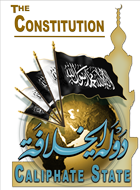Select your language

The Constitution of the Caliphate State / Ruling System
The Constitution of the Caliphate State / Ruling System
- Details
- Category: Ruling System §16-23
 Article 16: The system of ruling is a unitary system and not a federal system.
Article 16: The system of ruling is a unitary system and not a federal system.
Read more: Article 16: The system of ruling unitary, not a federal
- Details
- Category: Ruling System §16-23
 Article 17: The ruling is centralised and the administration is decentralised.
Article 17: The ruling is centralised and the administration is decentralised.
- Details
- Category: Ruling System §16-23
 Article 18: There are four types of rulers: the Khalifah, the delegated assistant, the governor, and the worker (’amil), and whoever falls under the same rule. As for anyone else, they are not considered rulers, but rather employees.
Article 18: There are four types of rulers: the Khalifah, the delegated assistant, the governor, and the worker (’amil), and whoever falls under the same rule. As for anyone else, they are not considered rulers, but rather employees.
- Details
- Category: Ruling System §16-23
 Article 19: It is not permitted for anyone to be in charge of ruling or any action considered to be from the ruling unless they are male, free, adult, sane, just, capable of carrying out the responsibility, and it is not permitted for anyone other than a Muslim.
Article 19: It is not permitted for anyone to be in charge of ruling or any action considered to be from the ruling unless they are male, free, adult, sane, just, capable of carrying out the responsibility, and it is not permitted for anyone other than a Muslim.
- Details
- Category: Ruling System §16-23
 Article 20: Accounting of the rulers by Muslims is one of their rights and an obligation of sufficiency upon them. The non-Muslim subjects have the right to voice complaint regarding the ruler’s injustice towards them or misapplication of the rules of Islam upon them.
Article 20: Accounting of the rulers by Muslims is one of their rights and an obligation of sufficiency upon them. The non-Muslim subjects have the right to voice complaint regarding the ruler’s injustice towards them or misapplication of the rules of Islam upon them.
Read more: Article 20: Right and duty to accountable the rulers
- Details
- Category: Ruling System §16-23
 Article 21:The Muslims have the right to establish political parties in order to account the rulers or to reach the rule through the Ummah on the condition that their basis is the Islamic 'Aqeedah and that the rules they adopt are Shari’ah rules. The formation of a party does not require any permission. Any group formed on an un-Islamic basis is prohibited.
Article 21:The Muslims have the right to establish political parties in order to account the rulers or to reach the rule through the Ummah on the condition that their basis is the Islamic 'Aqeedah and that the rules they adopt are Shari’ah rules. The formation of a party does not require any permission. Any group formed on an un-Islamic basis is prohibited.
- Details
- Category: Ruling System §16-23
 Article 22: The ruling system is built upon four principles which are:
Article 22: The ruling system is built upon four principles which are:
- Sovereignty is for the Shari’ah rather than fort the people
- The authority is for the Ummah
- To appoint a single Khalifah is an obligation upon the Muslims
- The Khalifah alone has the right to adopt Shari’ah rules, so he is the one who enacts the constitution and the rest of the laws
- Details
- Category: Ruling System §16-23

Article 23: The state apparatus is established upon thirteen institutions:
- The Khalifah (Leader of the State)
- The Assistants (delegated ministers)
- Executive minister
- The Governors
- The Amir of Jihad
- The Internal Security
- The Foreign Affairs
- Industry
- The Judiciary
- The People’s Affairs (administrative apparatus)
- The Treasury (Bayt Al-Mal)
- Media
- The Ummah’s Council (Shura and accounting)
